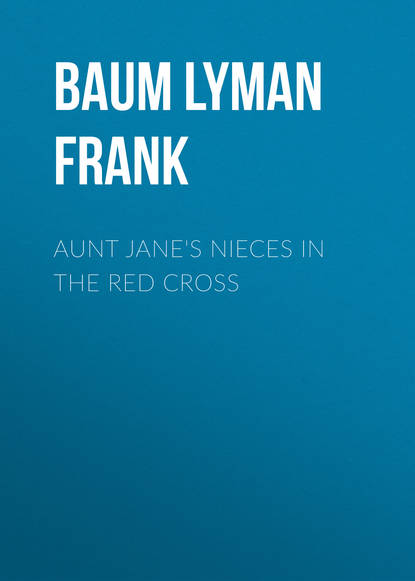По всем вопросам обращайтесь на: info@litportal.ru
(©) 2003-2025.
✖
Aunt Jane's Nieces in the Red Cross
Настройки чтения
Размер шрифта
Высота строк
Поля
"What do you think that fool did?" asked the boy, as Gys slunk away to his room.
"Tell us," pleaded Patsy, who was one of the curious group surrounding him.
"We had gone near to where a machine gun was planted, to pick up a fallen soldier, when without warning the Germans charged the gun. Maurie and I made a run for life, but Gys stood stock still, facing the enemy. A man at the gun reeled and fell, just then, and with a hail of bullets flying around him the doctor coolly walked up and bent over him. The sight so amazed the Germans that they actually stopped fighting and waited for him. Perhaps it was the Red Cross on the doctor's arm that influenced them, but imagine a body of soldiers in the heat of a charge suddenly stopping because of one man!"
"Well, what happened?" asked Mr. Merrick.
"I couldn't see very well, for a battery that supported the charge was shelling the retreating Allies and just then our ambulance was hit. But Maurie says he watched the scene and that when Gys attempted to lift the wounded man up he suddenly turned weak as water. The Germans had captured the gun, by this time, and their officer himself hoisted the injured man upon the doctor's shoulders and attended him to our ambulance. When I saw the fight was over I hastened to help Gys, who staggered so weakly that he would have dropped his man a dozen times on the way had not the Germans held him up. They were laughing, as if the whole thing was a joke, when crack! came a volley of bullets and with a great shout back rushed the French and Belgians in a counter-charge. I admit I ducked, crawling under the ambulance, and the Germans were so surprised that they beat a quick retreat.
"And now it was that Gys made a fool of himself. He tore off his cap and coat, which bore the Red Cross emblem, and leaped right between the two lines. Here were the Germans, firing as they retreated, and the Allies firing as they charged, and right in the center of the fray stood Gys. The man ought to have been shot to pieces, but nothing touched him until a Frenchman knocked him over because he was in the way of the rush. It was the most reckless, suicidal act I ever heard of!"
Uncle John looked worried. He had never told any of them of Dr. Gys' strange remark during their first interview, but he had not forgotten it. "I'll be happier when I can shake off this horrible envelope of disfigurement," the doctor had declared, and in view of this the report of that day's adventure gave the kind-hearted gentleman a severe shock.
He walked the deck thoughtfully while the girls hurried below to look after the new patients who had been brought, not too comfortably, in the damaged ambulance. "It was a bad fight," Ajo had reported, "and the wounded were thick, but we could only bring a few of them. Before we left the field, however, an English ambulance and two French ones arrived, and that gave us an opportunity to get away. Indeed, I was so unnerved by the dangers we had miraculously escaped that I was glad to be out of it."
Uncle John tried hard to understand Doctor Gys, but the man's strange, abnormal nature was incomprehensible. When, half an hour later, Mr. Merrick went below, he found the doctor in the operating room, cool and steady of nerve and dressing wounds in his best professional manner.
Upon examination the next morning the large ambulance was found to be so badly damaged that it had to be taken to a repair shop in the city to undergo reconstruction. It would take several weeks to put it in shape, declared the French mechanics, so the Americans would be forced to get along with the smaller vehicle. Jones and Dr. Kelsey made regular trips with this, but the fighting had suddenly lulled and for several days no new patients were brought to the ship, although many were given first aid in the trenches for slight wounds.
So the colony aboard the Arabella grew gradually less, until on the twenty-sixth of November the girls found they had but two patients to care for – Elbl and Andrew Denton. Neither required much nursing, and Denton's young wife insisted on taking full charge of him. But while the hospital ship was not in demand at this time there were casualties day by day in the trenches, where the armies faced each other doggedly and watchfully and shots were frequently interchanged when a soldier carelessly exposed his person to the enemy. So the girls took turns going with the ambulance, and Uncle John made no protest because so little danger attended these journeys.
Each day, while one of the American girls rode to the front, the other two would visit the city hospitals and render whatever assistance they could to the regular nurses. Gys sometimes accompanied them and sometimes went to the front with the ambulance; but he never caused his friends anxiety on these trips, because he could not endanger his life, owing to the cessation of fighting.
The only incident that enlivened this period of stagnation was the capture of Maurie. No; the authorities didn't get him, but Clarette did. Ajo and Patsy had gone into the city one afternoon and on their return to the docks, where their launch was moored, they found a street urchin awaiting them with a soiled scrap of paper clenched fast in his fist. He surrendered it for a coin and Patsy found the following words scrawled in English:
"She has me fast. Help! Be quick. I cannot save myself so you must save me. It is your Maurie who is in distress."
They laughed a little at first and then began to realize that the loss of their chauffeur would prove a hardship when fighting was resumed. Maurie might not be a good husband, and he might be afraid of a woman, but was valuable when bullets were flying. Patsy asked the boy:
"Can you lead us to the man who gave you this paper?"
"Oui, mamselle."
"Then hurry, and you shall have five centimes more."
The injunction was unnecessary, for the urchin made them hasten to keep up with him. He made many turns and twists through narrow alleys and back streets until finally he brought them to a row of cheap, plastered huts built against the old city wall. There was no mistaking the place, for in the doorway of one of the poorest dwellings stood Clarette, her ample figure fairly filling the opening, her hands planted firmly on her broad hips.
"Good evening," said Patsy pleasantly. "Is Maurie within?"
"Henri is within," answered Clarette with a fierce scowl, "and he is going to stay within."
"But we have need of his services," said Ajo sternly, "and the man is in our employ and under contract to obey us."
"I also need his services," retorted Clarette, "and I made a contract with him before you did, as my marriage papers will prove."
The little boy and girl had now crowded into the doorway on either side of their mother, clinging to her skirts while they "made faces" at the Americans. Clarette turned to drive the children away and in the act allowed Patsy and Ajo to glance past her into the hut.
There stood little Maurie, sleeves rolled above his elbows, bending over a battered dishpan where he was washing a mess of cracked and broken pottery. He met their gaze with a despairing countenance and a gesture of appeal that scattered a spray of suds from big wet fingers. Next moment Clarette had filled the doorway again.
"You may as well go away," said the woman harshly.
Patsy stood irresolute.
"Have you money to pay the rent and to provide food and clothing?" she presently asked.
"I have found a few francs in Henri's pockets," was the surly reply.
"And when they are gone?"
Clarette gave a shrug.
"When they are gone we shall not starve," she said. "There is plenty of charity for the Belgians these days. One has but to ask, and someone gives."
"Then you will not let us have Maurie?"
"No, mademoiselle." Then she unbent a little and added: "If my husband goes to you, they will be sure to catch him some day, and when they catch him they will shoot him."
"Why?"
"Don't you know?"
"No."
Clarette smiled grimly.
"When Henri escapes me, he always gets himself into trouble. He is not so very bad, but he is careless – and foolish. He tries to help the Germans and the French at the same time, to be accommodating, and so both have conceived a desire to shoot him. Well; when they shoot him he can no longer earn money to support me and his children."
"Are they really his children?" inquired young Jones.
"Who else may claim them, monsieur?"
"I thought they were the children of your first husband, the blacksmith."
Clarette glared at him, with lowering brow.
"Blacksmith? Pah! I have no husband but Henri, and heaven forsook me when I married him."
"Come, Patsy," said Ajo to his companion, "our errand here is hopeless. And – perhaps Clarette is right."
They made their way back to the launch in silence. Patsy was quite disappointed in Maurie. He had so many admirable qualities that it was a shame he could be so untruthful and unreliable.
As time passed on the monotony that followed their first exciting experiences grew upon them and became oppressive. December weather in Flanders brought cutting winds from off the North Sea and often there were flurries of snow in the air. They had steam heat inside the ship but the deck was no longer a practical lounging place.
Toward the last of the month Lieutenant Elbl was so fully recovered that he was able to hobble about on crutches. The friendship between the two cousins continued and Elbl was often found in the captain's room. No more had been said about a parole, but the French officials were evidently keeping an eye on the German, for one morning an order came to Mr. Merrick to deliver Elbl to the warden of the military prison at Dunkirk on or before ten o'clock the following day.
While the German received this notification with his accustomed stolid air of indifference, his American friends were all grieved at his transfer. They knew the prison would be very uncomfortable for the invalid and feared he was not yet sufficiently recovered to be able to bear the new conditions imposed upon him. There was no thought of protesting the order, however, for they appreciated the fact that the commandant had been especially lenient in leaving the prisoner so long in their care.
The Americans were all sitting together in the cabin that evening after dinner, when to their astonishment little Maurie came aboard in a skiff, bearing an order from the French commandant to Captain Carg, requesting him to appear at once at military headquarters.

















